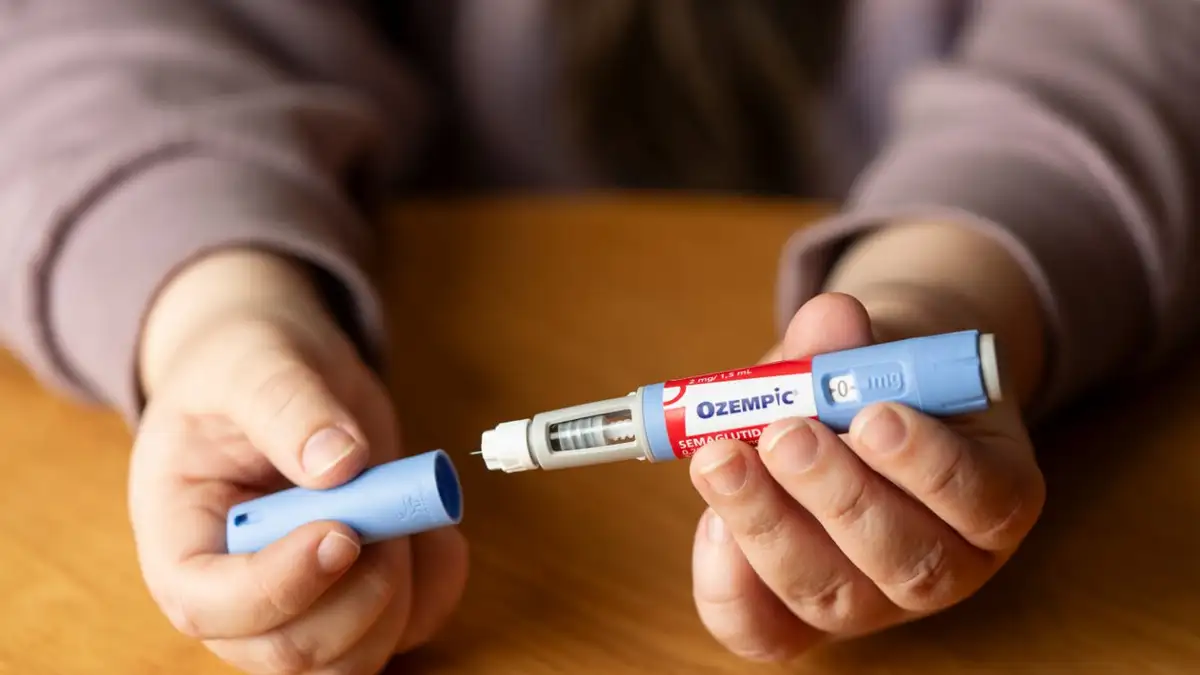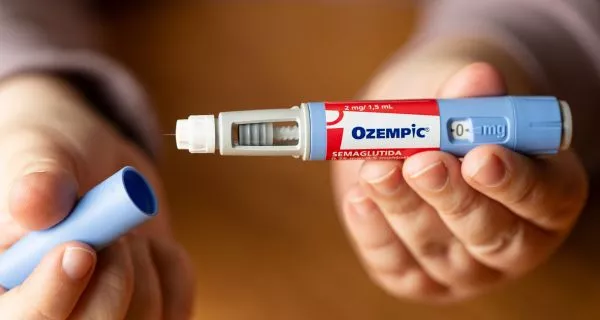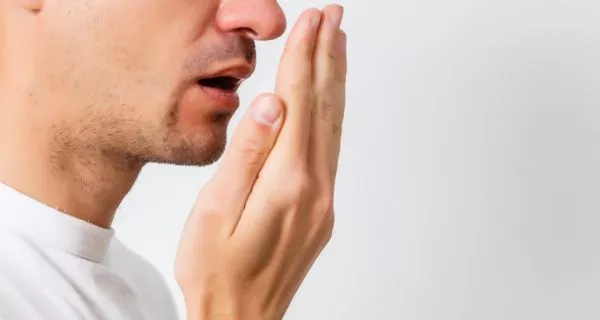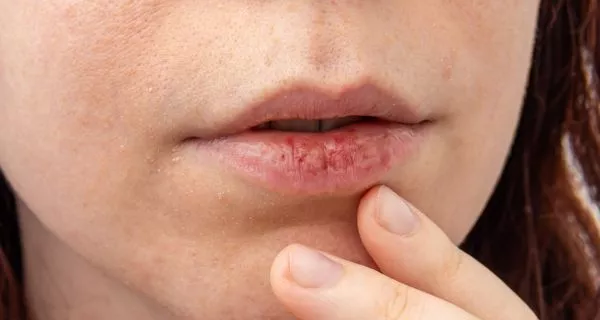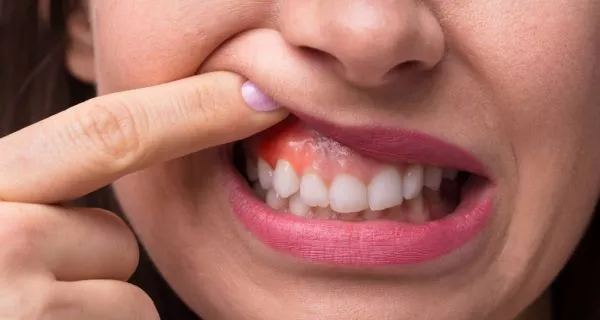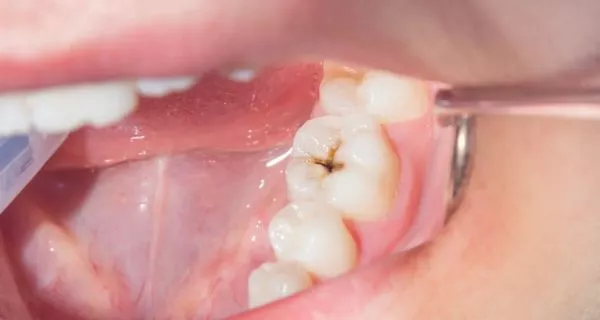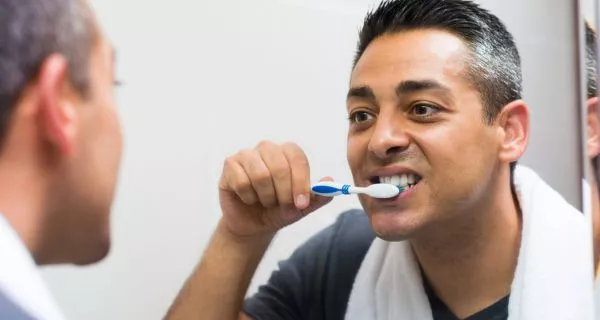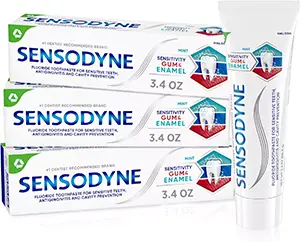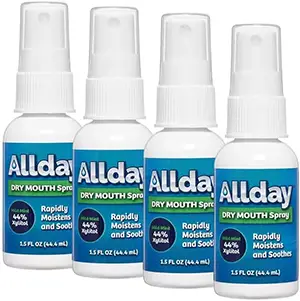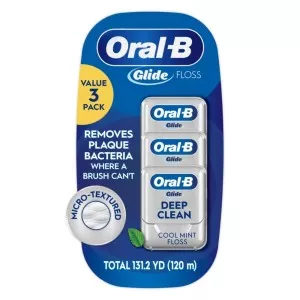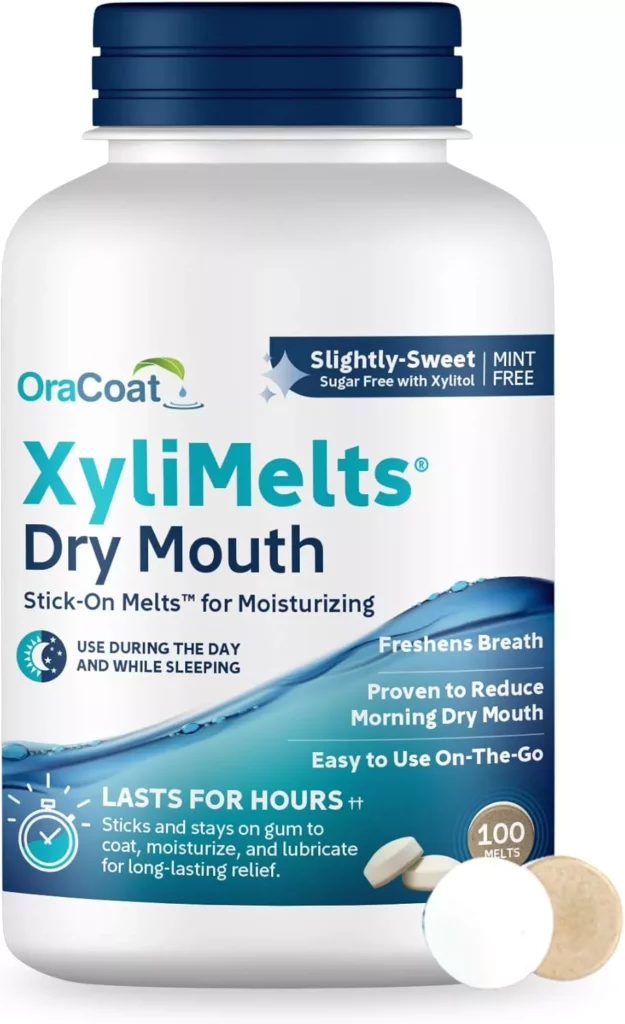Last Updated on: 8th December 2025, 08:54 am
Ozempic helps control blood sugar and support weight loss, but it may also affect the mouth. A common side effect is dry mouth, which can lead to bad breath, sensitive gums, and a higher risk of cavities. Understanding these oral changes will help you protect your teeth while using this medication.
Ozempic has become a very popular medicine for diabetes and weight loss. Most people know that it can cause nausea or stomach changes, but many are surprised to learn about the side effects of Ozempic in the mouth.
Because our mouth is very sensitive, even small changes in hydration, digestion, or blood sugar can create discomfort or early dental problems.
When a medication changes how your body works, your teeth and gums may show signs like dryness, irritation, or bad breath. In this article, you will learn how Ozempic works, why it can influence your oral health, and what simple habits can protect your smile.
What is Ozempic and how does it work?
Ozempic is a medicine called a GLP-1 receptor agonist. This means it copies a natural hormone in your body. This hormone helps:
- control blood sugar
- slow digestion
- reduce appetite
- increase insulin production
- weight loss
Many people use Ozempic for type 2 diabetes, while many others use it for weight loss, even if they do not have diabetes. This is why Ozempic has become so popular in recent years.
However, when digestion slows and appetite changes, your mouth can also change. Most people expect nausea or stomach problems, but very few expect dental problems. This is why symptoms in the mouth can feel confusing or surprising.
What are the most common side effects of Ozempic?
Ozempic usually affects the stomach first. Many people notice nausea, bloating, or constipation, especially in the beginning. These are normal reactions while the body adjusts.
Changes can also appear in the mouth. These issues are less known, so they often surprise users. Some people experience:
- bad breath
- a bitter or metallic taste
- gum irritation
- more plaque than usual
- small cavities forming easier
- occasional mouth infections
These problems often start small, but if they continue for many weeks or months, they can become serious and damage your teeth or gums.
Some people call this “Ozempic mouth” or “Ozempic teeth”. It does not mean the medicine directly harms teeth, but its side effects can increase dental risks.
How does Ozempic affect the body and why can it impact your mouth?
Ozempic changes how your stomach works, how your body uses food, and how thirsty you feel. These changes can also create problems in your mouth.
How does the body react to Ozempic?
Ozempic slows down how fast the stomach empties. This is helpful for blood sugar and appetite control, but it can create effects such as:
- longer digestion times
- more pressure or discomfort in the stomach
- occasional nausea
- vomiting in some people
When vomiting happens, stomach acid can reach the teeth and irritate the gums. Acid can wear down the enamel, which makes the teeth more sensitive.
Why can these changes affect your mouth?
When digestion changes, the balance inside the mouth also changes. For example:
- Acid from the stomach can damage enamel.
- Changes in diet can influence plaque and bacteria.
- A smaller appetite means people eat less often, which can modify taste or breath.
- Metabolic changes can alter the natural smell of the breath.
These effects do not appear in everyone, but they help explain why some people notice discomfort in their mouth even if the medicine is working well in the rest of the body.
How exactly does Ozempic affect oral health?
Below are the main oral problems linked to Ozempic, and simple explanations to help you understand why they happen.
1. Why does Ozempic cause dry mouth?
Saliva protects the mouth all day. It washes food away, controls bacteria, and keeps enamel strong. With Ozempic, saliva secretion can drop because digestion slows and thirst decreases.
Dry mouth can cause
- more cavities
- cracked lips
- burning or sore tongue
- trouble swallowing
- bad breath
How to manage it
- Drink water often.
- Use saliva-boosting gels or sprays.
- Chew sugar-free gum.
- Avoid alcohol-based mouthwash.
2. Why do many people get bad breath?
Bad breath can appear for two main reasons:
- Dry mouth: When saliva decreases, bacteria grow faster. These bacteria release strong odors.
- Fat breakdown: During weight loss, the body burns fat quickly. This can create a metabolic state called ketosis, which causes a fruity, sour or metallic smell.
What helps
- chewing sugar-free gum
- regular brushing and flossing
- drinking more water
- cleaning the tongue daily
3. How does Ozempic change taste perception?
Some people say food tastes metallic, bitter, or “not the same.” Called dysgeusia, it happens because GLP-1 medicines affect how the brain receives taste signals.
This change may cause people to crave stronger flavors, often salty or sweet foods, which can increase cavity risk, especially with low saliva production.
What to do
- Rinse your mouth with water before or after meals.
- Choose fresh fruits and vegetables to stimulate saliva.
- Limit sugary or very salty snacks.
- Eat small, frequent meals to reduce taste changes.
4. Can Ozempic make your gums more sensitive?
Yes. It can happen for several reasons:
- Less saliva means more bacteria near the gumline.
- Diabetic users may already have weak gum tissue.
- Slower digestion can affect blood flow in oral tissues.
Sensitive gums may show:
- redness
- bleeding
- swelling
- pain while brushing
If symptoms continue, it can develop into gingivitis or even periodontitis.
How to manage it:
- Use a soft-bristled toothbrush.
- Brush gently and thoroughly.
- Floss carefully once a day.
- See your dentist if bleeding continues.
5. Can Ozempic affect enamel and tooth sensitivity?
Yes, especially if you have reflux, vomiting, or a dry mouth.
- Acid can slowly remove enamel.
- Thin enamel can make teeth sensitive to cold, heat, or sweets.
What helps
- Rinse with water after reflux or vomiting.
- Avoid brushing immediately after acid exposure and wait 30 minutes before doing it.
- Use toothpaste for sensitive teeth.
6. Can Ozempic increase plaque and cavities?
Yes. The mix of less saliva, more bacteria, and changes in one’s diet can lead to more plaque and faster cavities. In fact, people with diabetes or a dry mouth have an even higher risk.
What to do
- Floss daily.
- Brush twice a day with fluoride toothpaste.
- Schedule regular dental cleanings.
7. Can Ozempic cause teeth grinding?
While less common, some users report more jaw tension or grinding, often linked to stress, sleep changes, or medication effects.
How to manage it:
- Relax your jaw before sleep.
- Avoid chewing gum excessively.
- Talk to your dentist about a night guard if needed.
All these problems can be side effects of Ozempic, but they are easily manageable with simple daily habits and regular dental care; in this way, you can protect your teeth and gums while using the medication.
How does Ozempic complicate oral health for diabetic patients?
People with diabetes already have higher risks for mouth problems. High blood sugar can:
- weaken the immune system.
- slow healing
- increase inflammation
When you add Ozempic to the mix, side effects like dry mouth, acid exposure, or changes in one’s diet can make oral problems worse.
Diabetic users may experience:
- gum disease
- tooth decay near the roots
- oral fungal infections
- slow healing after dental procedures
- difficulty wearing dentures
Studies show that around 22% of people with Type 1 or Type 2 diabetes experience gum problems.
Why does it matter?
Poor blood sugar control allows bacteria to grow more in the mouth, which can lead to severe gum disease. On the other hand, untreated gum disease can make diabetes harder to manage because inflammation affects the whole body.
Thus, it’s very important for diabetic patients using Ozempic to:
- keep blood sugar under control
- visit the dentist regularly
- watch for early signs of oral problems
- work closely with both their doctor and dentist
Understanding the connection between diabetes, Ozempic, and oral health will help patients and their doctors keep their overall health in balance.
How can you protect your teeth while using Ozempic?
You don’t need to stop Ozempic to protect your oral health. Here are some simple habits that will help you do this.
Stay hydrated
Drinking water throughout the day helps:
- keep the mouth moist
- reduce bacteria
- support digestion
- protect enamel
Avoid too much alcohol or caffeine because they dry the mouth even more.
Maintain excellent oral hygiene
Good daily habits prevent bacteria from growing. Helpful steps:
- Brush twice a day with fluoride toothpaste.
- Floss every night.
- Clean your tongue.
- Use an electric toothbrush for better results.
Use saliva boosters
Saliva substitutes help reduce discomfort during dry mouth episodes. Useful options include:
- moisturizing gels
- hydrating sprays
- xylitol lozenges
- sugar-free gum
These options stimulate natural saliva and reduce bad breath.
Rinse smartly
The right mouthwash can help maintain a healthy environment. Choose products that:
- are alcohol-free
- are fluoride-rich
- contain xylitol
Avoid strong, alcohol-based rinses because they make dryness worse.
See your dentist regularly
Your dentist can detect problems before you feel symptoms. Professional care may include:
- fluoride treatments
- deep cleaning
- gum evaluations
- night guards if grinding increases
Regular check-ups every 6 months (or every 3 months for diabetics) are strongly recommended.
When should you talk to your dentist or doctor?
Seek help if you experience:
- a persistent dry mouth
- constant bad breath
- red or bleeding gums
- mouth sores that are not heal
- difficulty chewing or swallowing
- white patches (possible fungal infection)
Early treatment prevents long-term damage. Always inform your dentist if you are taking Ozempic so they will create a personalized care plan.
How can FindDentist help you?
If you travel a lot or wish to save money on dental care, FindDentist can help. It is an easy way to find trusted dentists in different cities and countries. You can compare prices and services and book appointments safely and quickly.
Dental travel can save money and give access to skilled specialists, modern treatments, and follow-ups, even if you are far from home.
What to look for when choosing a dentist in another city or country:
- certifications and professional experience
- reviews from other patients
- modern equipment and updated techniques
- follow-up or virtual consultation options
With FindDentist, locating the right dentist is fast and safe. You can plan check-ups and treatments easily, keeping your mouth healthy while using Ozempic.
Why should you pay attention to oral health while taking Ozempic?
Ozempic is an effective medication for diabetes and weight loss, but it can also affect teeth and gums. By understanding how the side effect of Ozempic impacts your mouth, you can take simple steps to prevent damage.
At World of Dentistry, we believe that caring for your mouth is caring for your whole body. With the right habits and regular dental visits, you can enjoy the benefits of Ozempic while keeping your smile healthy and strong.
Frequently Asked Questions
What is Ozempic?
How often should I visit the dentist while on Ozempic?
Can Ozempic cause mouth sores?
Can weight loss affect my teeth while on Ozempic?
How does diabetes make Ozempic oral side effects worse?
Voice and Search (Q&A)
Are taste changes permanent with Ozempic?
Usually no. Taste often returns to normal after your body adjusts to the medicine.
Will Ozempic damage my teeth?
Not directly, but dry mouth, acid reflux, and diet changes can cause cavities, enamel erosion, and sensitivity. Good oral hygiene helps prevent problems.
When should I see a dentist if I take Ozempic?
If your gums bleed, your teeth become sensitive, you notice persistent bad breath, or mouth sores don’t heal, see a dentist as soon as possible.
Share
References
1. American Dental Association. (n. d). Ozempic may yield weight loss but also bad breath. ADA News. https://adanews.ada.org/huddles/ozempic-may-yield-weight-loss-but-also-bad-breath/
2. Cleveland Clinic. (2025, August 29). Semaglutide injection. https://my.clevelandclinic.org/health/drugs/19011-semaglutide-injection
3. Fisher, J. (2025, April 14). How does Ozempic work? Understanding GLP-1s for diabetes, weight loss, and beyond. Harvard Health. https://www.health.harvard.edu/staying-healthy/how-does-ozempic-work-understanding-glp-1s-for-diabetes-weight-loss-and-beyond
4. Levine, N. (2025, October 23). Oral care considerations for patients using semaglutide, similar medications. ADA News. https://adanews.ada.org/ada-news/2025/october/oral-care-considerations-for-patients-using-semaglutide-similar-medications/
5. Schimelpfening, N. (2025, June 5). ‘Ozempic teeth’ may cause tooth decay, other dental health effects. Healthline. https://www.healthline.com/health-news/ozempic-teeth-may-impact-dental-health
-
Dr. Yeidy Carolina Mesa [Author]
DDS Yeidy Carolina Mesa Passionate Dentist | Advocate for Accessible Oral Health Education Graduating from Universidad CES in 2022, I am a dedicated general dentist with a lifelong passion for helping others and making a meaningful impact in the world. My journey into dentistry began at the age of 7, inspired by my own experience with braces and overcoming a fear of the dentist. This personal journey shaped my mission to help patients conquer their own dental anxieties and embrace a healthier,...
View all posts
-
Nayibe Cubillos M. [Medical Reviewer]
Pharmaceutical Chemestry |Pharmaceutical Process Management | Pharmaceutical Care | Pharmaceutical Services Audit | Pharmaceutical Services Process Consulting | Content Project Manager | SEO Knowledge | Content Writer | Leadership | Scrum Master
View all posts
A healthcare writer with a solid background in pharmaceutical chemistry and a thorough understanding of Colombian regulatory processes and comprehensive sector management, she has significant experience coordinating and leading multidisciplina...


